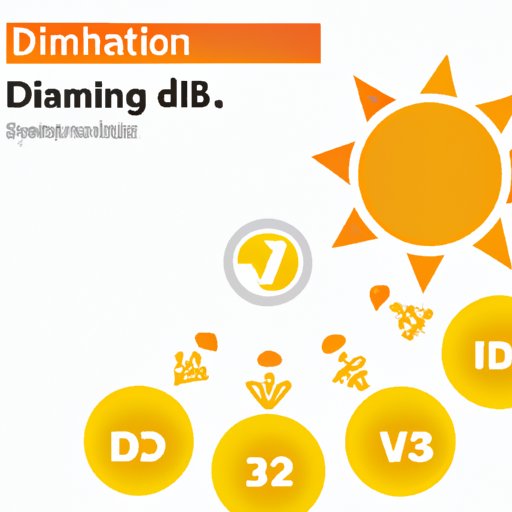Introduction
Vitamin D3 is an essential nutrient that helps keep the body healthy. It plays a crucial role in regulating calcium and phosphate levels, which are essential for healthy bones, teeth, and muscle function. However, taking too much vitamin D3 can be dangerous and lead to a variety of health problems. In this article, we’ll explore the benefits and risks of vitamin D3, as well as the recommended daily doses and natural sources of this important nutrient. We’ll also provide tips for discussing vitamin D3 intake with your healthcare provider.
Health Benefits of Vitamin D3
Vitamin D3 has many health benefits, including promoting healthy bones, supporting immune system function, and boosting mental health. It also helps the body absorb calcium, which is essential for strong bones and teeth. Vitamin D3 deficiency has been linked to rickets, osteoporosis, multiple sclerosis, and even certain cancers.
Research has shown that vitamin D3 can also have a positive effect on immune system function. It has been found to reduce the risk of respiratory infections, such as colds and flu. Studies have also linked vitamin D3 intake with a reduced risk of developing autoimmune diseases, such as rheumatoid arthritis and type 1 diabetes.
In addition to its physical health benefits, vitamin D3 has been found to play a role in mental health. Studies have shown that maintaining healthy levels of vitamin D3 can help prevent depression and other mood disorders.
Risks of Taking Too Much Vitamin D3
Although vitamin D3 is essential for good health, taking too much of it can have serious consequences. Vitamin D3 levels can become toxic, leading to a condition known as hypervitaminosis D. This can cause symptoms such as nausea, vomiting, and weakness in the bones. In severe cases, it can even lead to kidney failure.
Research has also suggested a link between excessive vitamin D3 intake and an increased risk of certain illnesses. For example, studies have shown that taking high doses of vitamin D3 may increase the risk of developing prostate cancer. It is important to note, however, that most people do not take enough vitamin D3 to cause these problems.
Recommended Daily Doses
The recommended daily intake of vitamin D3 varies depending on age, weight, and other factors. According to the National Institutes of Health, the recommended daily allowance for adults is 600 to 800 international units (IU). However, some studies suggest that larger doses may be needed to optimize health, especially for people who live in areas with limited sunlight or who do not get enough vitamin D3 from their diets.
In general, it is important to consult with a healthcare provider before taking vitamin D3 supplements, especially if you have a history of kidney disease or other health problems. Too much vitamin D3 can be dangerous, so it is important to follow the recommended daily doses and talk to your doctor if you experience any symptoms of hypervitaminosis D.
Natural Sources of Vitamin D3
The most natural way to get vitamin D3 is through exposure to sunlight. When the skin is exposed to sunlight, it produces vitamin D3. However, it is important to be cautious about sun exposure, as too much sun can increase the risk of skin cancer. The amount of sunlight needed to produce adequate amounts of vitamin D3 varies depending on a variety of factors, including skin color and geographic location.
In addition to sunlight, vitamin D3 can be found in certain foods. Foods that are high in vitamin D3 include fatty fish, such as salmon and mackerel, egg yolks, and fortified foods such as milk and cereal.
Talking to Your Healthcare Provider
If you are considering taking a vitamin D3 supplement, it is important to talk to your healthcare provider first. Your doctor can help you determine the appropriate dosage based on your unique health needs, and can also help you determine if you are at risk for vitamin D3 deficiency.
It is also important to let your doctor know if you are taking any other medications or supplements, as vitamin D3 can interact with certain drugs. Your doctor can help you determine if there are any potential interactions and advise you on the best course of action.
Conclusion
While vitamin D3 is an important nutrient that plays a crucial role in keeping the body healthy, it is important to take caution when supplementing with this vitamin. In general, it is best to get vitamin D3 naturally through sun exposure and a healthy diet. If you are considering taking a supplement, be sure to talk to your healthcare provider first to determine the appropriate dosage and to discuss any potential risks or interactions.
